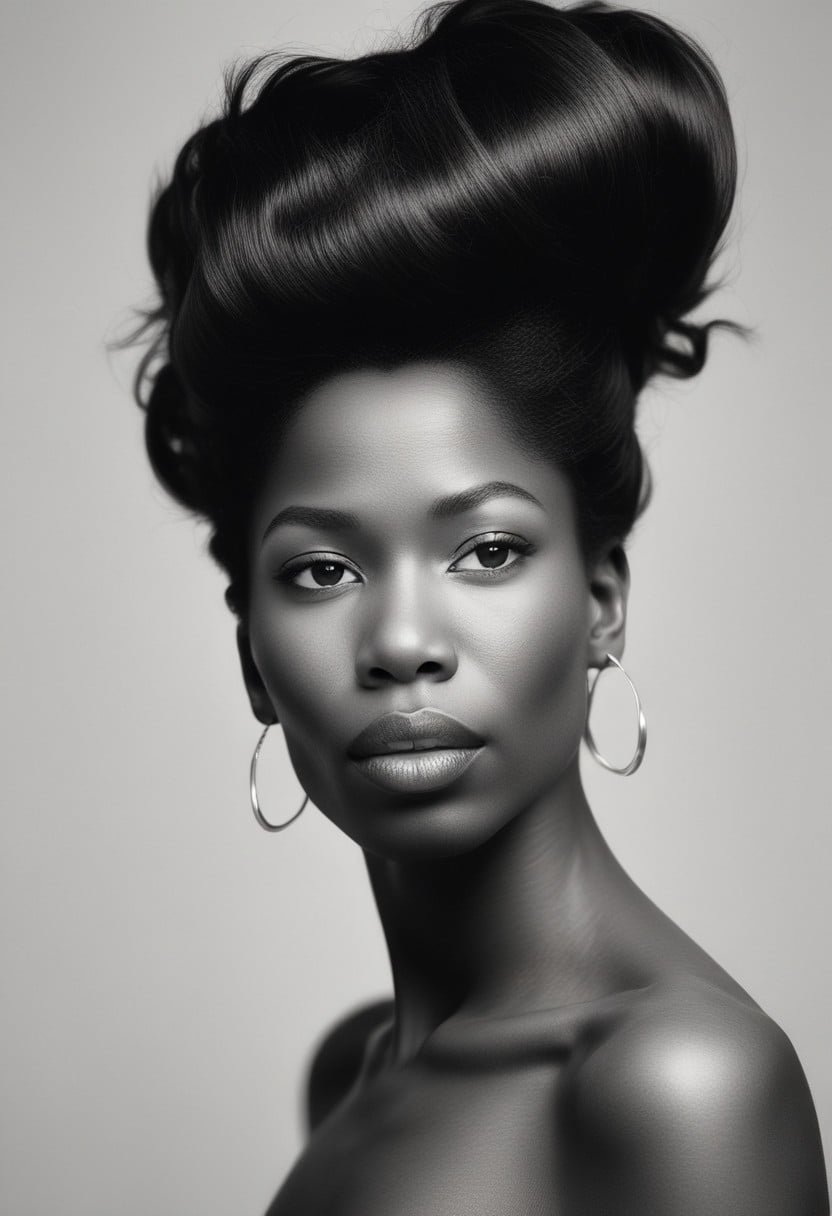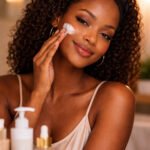
Looking for the best skin care products for African American skin prone to acne? Look no further! In this article, we will explore the world of African American acne skin care products, offering you valuable insights and recommendations. From cleansers to moisturizers, we’ll discuss the best ingredients to look for, popular black-owned brands to support, and effective remedies for achieving clear, healthy skin. Whether you’re a man or a woman, struggling with oily or dry skin, we’ve got you covered. Say goodbye to breakouts and hello to a radiant complexion with the right skin care routine tailored to your unique needs.
Understanding Acne on African American Skin
Acne is a common skin condition that affects people of all skin types, including African American skin. However, there are certain factors and challenges that make acne on African American skin unique. Understanding these factors is essential in developing an effective acne treatment regimen.
Factors Contributing to Acne
Acne is caused by a combination of factors, including excess oil production, clogged pores, bacteria, and inflammation. However, there are specific factors that may contribute to acne on African American skin. These factors include hormonal imbalances, genetics, and certain lifestyle factors such as diet and stress.
The Role of Melanin
Melanin is the pigment responsible for the color of our skin, hair, and eyes. It provides protection against ultraviolet (UV) radiation from the sun. However, African American skin has higher levels of melanin, which can make it more prone to certain types of acne, such as inflammatory acne and post-inflammatory hyperpigmentation. Understanding the role of melanin in acne is crucial for developing targeted treatment strategies.
Specific Challenges for African American Skin Acne
African American skin has unique characteristics that can present specific challenges when it comes to acne. The high melanin content can make acne scars more visible, leading to concerns about hyperpigmentation. Additionally, the use of certain acne treatments, such as harsh exfoliants, can exacerbate inflammation and irritation, leading to further skin damage. Developing a tailored approach to acne treatment for African American skin is essential to ensure effective and safe results.
Significance of a Proper Skin Care Routine
Maintaining a proper skin care routine is crucial for overall skin health and the prevention and treatment of acne. A well-rounded skin care regimen can help manage oil production, unclog pores, reduce inflammation, and promote healing.
Setting Up a Daily Skin Care Regimen
Building a daily skin care regimen involves a few essential steps. First, it is important to cleanse the skin using a gentle facial cleanser specifically formulated for acne-prone skin. This helps remove excess oil, dirt, and bacteria from the skin’s surface. After cleansing, it is important to apply a toner to balance the skin’s pH levels and remove any residual impurities. Next, apply a lightweight moisturizer that is oil-free and non-comedogenic to hydrate the skin without clogging the pores. Finally, always remember to apply sunscreen with at least SPF 30 or SPF 50 to protect the skin from harmful UV rays.
Understanding Your Skin Type
Understanding your skin type is essential in selecting the right products for your acne-prone skin. African American skin can range from oily to combination to dry, and it is important to tailor your skin care routine accordingly. If you have oily skin, look for products that help control oil production and prevent clogged pores. For dry skin, focus on hydrating and moisturizing products that nourish the skin without causing further dryness. Combination skin requires a balanced approach, using products that address both oily and dry areas.
Significance of Hydration in Skin Care
Proper hydration is vital for maintaining healthy skin. Adequately hydrating the skin can help regulate oil production, prevent dryness, and promote healing. Look for moisturizers and serums that contain ingredients like hyaluronic acid, which has the ability to hold onto water and keep the skin hydrated throughout the day. Hydrated skin is less prone to inflammation, acne breakouts, and the development of acne scars.
The Need for Regular Exfoliation
Exfoliation is an important step in any skin care routine, as it helps remove dead skin cells, unclog pores, and promote cell turnover. However, it is crucial to choose gentle exfoliants that won’t cause irritation or inflammation, especially for African American skin. Harsh exfoliation can lead to further skin damage and hyperpigmentation. Look for exfoliating products that use gentle ingredients like salicylic acid or fruit enzymes to provide effective exfoliation without causing harm to the skin.
Choosing the Right African American Skin Care Products
When it comes to choosing skin care products for acne treatment, it is important to consider the specific needs and characteristics of African American skin. Here are some factors to keep in mind:
What to Look for in an Acne Product
When selecting an acne product, look for ingredients that target the underlying causes of acne, such as excess oil, bacteria, and inflammation. Some key ingredients to look for include salicylic acid, benzoyl peroxide, tea tree oil, and sulfur. These ingredients have been proven to effectively treat acne and can be found in various acne treatment products.
Importance of Natural Ingredients
Using products with natural ingredients can be beneficial for African American skin. Natural ingredients often have fewer harsh chemicals and are less likely to cause irritation or inflammation. Look for products that contain natural ingredients like aloe vera, chamomile, green tea extract, and witch hazel, which can help soothe and calm the skin.
Understanding the Role of Skin Care Products in Acne Treatment
Skin care products play a crucial role in acne treatment by targeting the root causes of acne and promoting healthy skin. Cleansers help remove excess oil and impurities, toners balance the skin’s pH levels, moisturizers hydrate and nourish the skin, and acne treatment products target acne-causing bacteria and inflammation. Using a combination of these products can help manage acne and improve the overall health of the skin.
Black-Owned Skincare Brands
The beauty industry has seen a rise in black-owned skincare brands that cater specifically to the needs of African American skin. Supporting these brands not only helps promote diversity and inclusivity but also provides access to products that are designed to address the unique challenges of African American skin. Here are some notable black-owned skincare brands:
Highlighting Black-Owned Skincare Brands
There are several black-owned skincare brands that have gained popularity and recognition for their effective formulations and commitment to diversity. Brands like Fenty Skin by Rihanna, Buttah Skin by Dorion Renaud, and Beauty of Joseon offer a range of products specifically designed for African American skin.
Specific Black-Owned Skincare Products for Acne
Black-owned skincare brands have developed products specifically targeted towards acne-prone skin. These products often contain natural ingredients, such as African black soap, tea tree oil, and shea butter, known for their anti-inflammatory and antibacterial properties. Incorporating these products into your acne treatment regimen can help provide effective results while supporting black-owned businesses.
Role of Black-Owned Skincare Brands in Acne Treatment
The presence of black-owned skincare brands in the market plays a crucial role in addressing the specific needs and concerns of African American skin. These brands understand the unique challenges that individuals with African American skin face when it comes to acne and provide tailored solutions. Supporting black-owned skincare brands not only helps individuals find products that work for their skin but also promotes inclusivity and diversity within the beauty industry.
Assessing the Efficacy of Specific Acne Products for African American Skin
There are several acne products available in the market, but it is important to assess their efficacy before incorporating them into your skincare routine. Here are some specific products that have shown promising results for African American skin:
Review of Salicylic Acid in Acne Treatment
Salicylic acid is a common ingredient found in many acne treatment products. It works by exfoliating the skin, unclogging pores, and reducing inflammation. For African American skin, it is important to choose products that contain a lower concentration of salicylic acid to avoid irritation or excessive peeling.
Benefits of Vitamin C Serum
Vitamin C serums have gained popularity for their ability to brighten the skin, reduce hyperpigmentation, and stimulate collagen production. For African American skin, vitamin C serums can help even out skin tone, fade acne scars, and promote a radiant complexion.
The Importance of Sunscreen SPF 30 or SPF 50
Sunscreen is a vital step in any skincare routine, including for individuals with African American skin. While higher levels of melanin do provide some natural protection against UV radiation, it is still important to wear sunscreen daily to prevent sun damage, reduce the risk of hyperpigmentation, and protect against skin cancer. Look for sunscreens with at least SPF 30 or SPF 50 and broad-spectrum protection.
The Role of Retinol and Acne
Retinol is a derivative of vitamin A and has been widely used in the treatment of acne. It helps unclog pores, reduce inflammation, and promote faster cell turnover. However, for individuals with African American skin, it is important to use retinol products with caution, as they can cause skin irritation and increase the risk of post-inflammatory hyperpigmentation. Starting with a lower concentration and gradually increasing use can help minimize these risks.
Focused Products for Acne Prone Skin
Choosing the right products for acne-prone skin is essential to effectively manage and treat acne. Here are some recommendations for acne-prone skin:
Recommendations for Acne Prone Skin
When selecting products for acne-prone skin, look for oil-free, non-comedogenic, and lightweight formulas that won’t clog the pores or exacerbate acne. Use products that contain ingredients like salicylic acid, benzoyl peroxide, tea tree oil, and sulfur to target acne-causing bacteria and reduce inflammation.
Specific Products for Oily Skin
Oily skin types may benefit from products that help regulate oil production and control shine. Look for oil-free moisturizers, mattifying primers, and oil-controlling cleansers that can help balance the skin and prevent clogged pores.
Effective Products for Combination Skin
Combination skin requires a balanced approach. Use gentle cleansers that won’t strip the skin of its natural oils and opt for lightweight, oil-free moisturizers that provide hydration without making the skin oily. Additionally, incorporating targeted treatments such as spot treatments for acne-prone areas can help manage breakouts.
Notable African American Acne Products
There are several African American acne products that have gained recognition for their efficacy in treating acne and addressing the unique needs of African American skin. Here are some notable products:
Benefits of African Black Soap
African black soap is a traditional cleanser known for its ability to cleanse, exfoliate, and soothe the skin. It is made from natural ingredients like cocoa pods, palm oil, and shea butter. African black soap can help unclog pores, reduce inflammation, and even out skin tone, making it a popular choice for individuals with acne-prone skin.
Effects of Facial Cleansers and Acne
Choosing the right facial cleanser is essential for effectively managing acne. Look for gentle cleansers that won’t strip the skin of its natural oils or disrupt the skin’s barrier. Avoid harsh ingredients like sulfates and fragrances, as they can irritate the skin and worsen acne symptoms.
The Role of Face Masks in Acne Treatment
Face masks can be a beneficial addition to an acne treatment regimen. Look for masks that contain ingredients like clay, charcoal, or sulfur, as they can help absorb excess oil, unclog pores, and reduce inflammation. However, it is important to use face masks in moderation and follow the instructions carefully to avoid over-drying or irritating the skin.
Identifying Effective Face Moisturizers
Finding the right face moisturizer is crucial for individuals with acne-prone skin. Look for lightweight, non-comedogenic, and oil-free formulas that provide hydration without clogging the pores. Ingredients like hyaluronic acid and ceramides can help lock in moisture and repair the skin’s barrier function.
Home Remedies and DIY Skincare for Acne
In addition to commercial acne products, there are also natural home remedies and DIY skincare options that can help manage acne on African American skin. However, it is important to approach these remedies with caution and consider your skin’s sensitivity and specific needs.
Exploring Natural DIY Treatments
Natural DIY treatments can be a cost-effective and accessible option for managing acne. Ingredients like honey, tea tree oil, aloe vera, and apple cider vinegar have been used for their antibacterial and anti-inflammatory properties. However, it is important to do a patch test and consult with a dermatologist before trying any new DIY treatment.
Benefits of Home Remedies
Home remedies can offer a more natural approach to acne treatment. They are often gentle on the skin, affordable, and easily accessible. Home remedies can provide temporary relief from acne symptoms and help soothe inflammation. However, they may not provide the same level of efficacy as commercial acne products, and individual results may vary.
Precautions While Using DIY Skincare
When using DIY skincare for acne, it is important to exercise caution and follow best practices. Always start with a patch test to assess your skin’s reaction to the ingredients. Avoid using ingredients that may irritate the skin or cause allergies. Additionally, consult with a dermatologist to ensure that DIY treatments are appropriate for your specific skin condition and needs.
Clinical Treatments for Acne on African American Skin
For severe or persistent acne, clinical treatments under the guidance of a dermatologist may be necessary. These treatments typically involve professional procedures and medications that can effectively manage and treat acne.
Overview of Clinical Treatments
Clinical treatments for acne can vary depending on the severity of the condition. Some common treatment options include prescription medications like topical retinoids, oral antibiotics, and hormonal therapies. In-office procedures such as chemical peels, microdermabrasion, and laser therapy may also be recommended to target acne and its underlying causes.
Role of Dermatologists in Acne Treatment
Dermatologists are experts in diagnosing and treating skin conditions, including acne. They can assess the severity of your acne, identify contributing factors, and develop a personalized treatment plan. Dermatologists can also provide guidance on proper skincare routines, recommend specific products, and monitor your progress over time.
Bespoke Treatments for African American Skin Acne
African American skin has unique characteristics that need to be taken into consideration when developing treatment plans for acne. Dermatologists experienced in treating African American skin can provide bespoke treatments that address the specific challenges of acne on this skin type. These treatments may combine topical medications, in-office procedures, and lifestyle modifications to achieve optimal results.
Lifestyle Modifications for Acne Management
In addition to a skincare routine and clinical treatments, certain lifestyle modifications can also help manage and prevent acne. Making changes to your diet, exercise routine, and stress management can contribute to overall skin health.
Impact of Diet on Skin Health
While there is no direct causal link between diet and acne, certain foods may trigger or exacerbate acne symptoms in some individuals. It is important to pay attention to your diet and identify any potential food triggers. Consider reducing your intake of high-glycemic foods, dairy products, and foods high in saturated fats. Increasing your consumption of fruits, vegetables, and foods rich in omega-3 fatty acids may have a positive impact on your skin health.
Exercise and Skin Health
Regular exercise can have several benefits for overall skin health. Exercise promotes circulation, which can help deliver oxygen and nutrients to the skin cells. It also helps reduce stress levels, which is known to contribute to acne breakouts. However, it is important to maintain proper hygiene during and after exercise to avoid sweat and bacteria buildup, which can lead to clogged pores.
Stress Management and Acne
Stress has been linked to various skin disorders, including acne. High levels of stress can increase sebum production and inflammation, leading to acne breakouts. Managing stress through practices like exercise, meditation, and self-care can help reduce the likelihood of acne flare-ups. Additionally, seeking support from mental health professionals can aid in stress management and overall well-being.
By understanding the factors contributing to acne on African American skin, implementing a proper skin care routine, choosing the right skincare products, and considering lifestyle modifications, individuals can effectively manage and treat acne. With the wide range of products and treatment options available, it is important to consult with a dermatologist for personalized advice and guidance. Taking care of your skin is a journey, and with the right approach, you can achieve a clear, healthy complexion.











